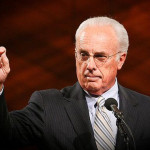 This excerpt is taken from Michael Horton’s contribution in much of today’s mainline Protestant and Roman Catholic biblical and theological scholarship would have been regarded by the medieval church as apostate with regard to its view of Scripture. The Scriptures, both sides held, are inerrant. The Council of Trent (condemning the Reformation positions) went so far as to say that the Spirit “dictated” the very words to the Apostles.
This excerpt is taken from Michael Horton’s contribution in much of today’s mainline Protestant and Roman Catholic biblical and theological scholarship would have been regarded by the medieval church as apostate with regard to its view of Scripture. The Scriptures, both sides held, are inerrant. The Council of Trent (condemning the Reformation positions) went so far as to say that the Spirit “dictated” the very words to the Apostles.
The real question had to do with the relation of inspired Scripture to tradition. In other words, is Scripture alone God’s inspired and inerrant Word, the source and norm for faith and practice? Could the pope say truly that his words are equal to those of Peter and Paul as we find them in Scripture? Are councils infallible in the same way as Scripture? The Council of Trent argued that Scripture and tradition are two streams that form the one river of God’s Word. This Word consists not only of “the written books” but also of “the unwritten traditions” that, of course, the Roman pontiff has the privilege of determining. Thus, both Scripture and these traditions the church “receives and venerates with an equal affection of piety and reverence,” as both have been “preserved in the Catholic Church by a continuous succession.”
Therefore, whatever the pope teaches or commands ex cathedra (from the chair)—even if it is not based on Scripture—is to be believed by all Christians everywhere as necessary for salvation. Ironically, Luther’s defense of sola Scriptura was condemned as schismatic, but the ancient fathers, both in the East and the West, would have regarded the pretensions of the Roman bishop as an act of separation (schism) from the Apostolic faith. Long before the Reformation, highly esteemed theologians argued that Scripture alone is normative and that councils simply interpret Scripture, and these interpretations (which may be wrong and amended by further reflection) are to be submitted to by the pope himself. Until the Council of Trent’s condemnations of the Reformation teaching, this was an open question. Luther was not the first to argue for Scripture’s unique authority even over the pope. After Trent, though, the door was slammed shut on sola Scriptura within the Roman Catholic faith.
Luther’s problem with the papal church was its corruptions of scriptural faith by the addition of myriad doctrines, practices, rituals, sacraments, and ceremonies. Medieval popes increasingly held that they alone were endowed with the Holy Spirit in such a way as to be preserved from error in their judgments. Of course, this idea was not found in Scripture or in the teaching of the ancient fathers. It was an innovation that opened the floodgate to a torrent of novelties, Luther argued:
“When the teaching of the pope is distinguished from that of the Holy Scriptures, or is compared with them, it becomes apparent that, at its best, the teaching of the pope has been taken from the imperial, pagan laws and is a teaching concerning secular transactions and judgments, as the papal decretals show. In keeping with such teaching, instructions are given concerning the ceremonies of the churches, vestments, food, personnel, and countless other puerilities, fantasies, and follies without so much as a mention of Christ, faith, and God’s commandments.”
How do you adjudicate between truth and error? What if a pope errs, as some medieval councils had in fact declared? Indeed, the fourteenth and early fifteenth centuries saw the schism between two and eventually three rival popes, each claiming St. Peter’s throne and excommunicating the others along with their followers. The Council of Constance ended this tragicomedy by electing a fourth pope to replace the other three. Philip Melanchthon’s Treatise on the Power and Primacy of the Pope built on Luther’s views by drawing together a battery of refutations from Scripture and also from church history to demonstrate the foundation of sand on which the papacy is built.
For Luther, the first plank of sola Scriptura is Scripture’s nature. As the Holy Spirit’s direct revelation through prophets and Apostles, Scripture is in a class by itself. The character of God is at stake in the character of Scripture. Why is Scripture inerrant? “Because we know that God does not lie. My neighbor and I—in short, all men—may err and deceive, but God’s Word cannot err.” We respect the church fathers and ancient councils as guides, but only God can establish articles of faith: “It will not do to make articles of faith out of the holy Fathers’ words or works. Otherwise what they ate, how they dressed, and what kind of houses they lived in would have to become articles of faith—as has happened in the case of relics. This means that the Word of God shall establish articles of faith and no one else, not even an angel.” Continue reading

